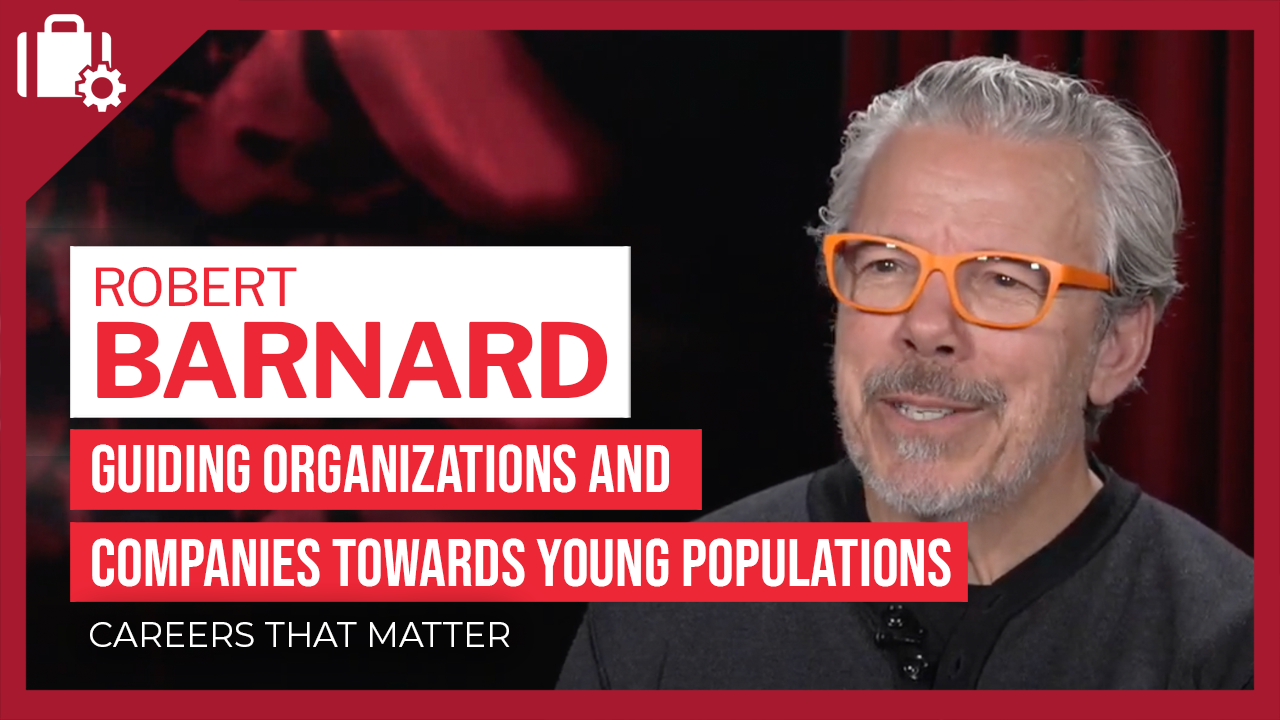
Episodes
Search episodes:
Browse by category
Discovering writing as a happy part of the job
Jennifer Geary is a writer but it may surprise people that she didn’t like to write. It started out of necessity as a chief operating officer, when she discovered that there was no how-do guide or book on that role. So she decided to give it a shot herself and it has morphed into a “happy part” of what she does.
Answering to a calling: Journey for a piano prodigy
For Sasha Luchkov, music is not just a career – it is something that is always with him. He hears it all the time subconsciously and it became clear very early that this is his calling. To reach his goal, he has learned that music is not just notes on a page, but also the feelings and intentions of the piece to make it come alive.
Combining a passion for finance and creativity
John Stackhouse graduated during the 1981 recession; seeing its impact, he decided to study something more practical – commerce. However, he had a creative itch to scratch. Joining the school newspaper gave him a desire to break out of the financial world after graduating and landed at the Globe and Mail as a business reporter, which led him to both the creative and practical sides of finance.
Demystifying Canadian public policy to the public
Public policy in Canada is a complicated topic. For Renaud Brossard, his job is to make the topic less complicated and more accessible to the public through media outlets. As a business major, he developed his policy analysis background over the years and by working with other high-end academics in the field.
Cultivating a career in prevention education
Cathy Peters is an advocate for those who cannot advocate for themselves. But she would describe her role as being in prevention education, cultivating her passion for the vulnerable. Her work in preventing child trafficking taps into that passion. This is a path that is almost custom-made for her, as an avid storyteller and absorbing others’ stories by learning and listening. “If I sound a little bit passionate,” she says, “I am.”
Researching how Canada can learn to live with China
Being an expert on China is a difficult job in today’s political climate – Paul Evans has to constantly explain that he is “not defending China, [but rather] how to live with China.” As a primary expert on Canada-China relations at the University of British Columbia, there is a demand for his insights nowadays, from the media and beyond. This is a career that he has aimed for right from the start. What makes his journey unique from other professors is that his entire education was in Canada, during a time when this was a difficult path to an academic career.
A career of knowing what makes people tick
No matter how much Mike Rowlands checks off his to-do list, the list keeps growing. That’s just the nature of being the founder and CEO of Junxion Strategy, an international social impact consultancy. This is a long way from his younger days, when he didn’t know what he wanted to do. He studied business in university and surprisingly didn’t like it. Over time, he experimented in various other businesses, including a bike shop, which gave him a first career where he learned about customer service, business, logistics, and everything in between – a valuable insight on what makes people tick
Juggling the many demands of a university science department
If you ask Angela Brooks-Wilson whether she is an administrator or scientist, she will say, “Both.” As the dean of a science department of Simon Fraser University, it is always a challenge to keep up with what is going on at the time and what the goals of the faculty are. She doesn’t do it alone, thanks to a solid team that handles staff, students, and infrastructure to make sure that everything runs smoothly.
Balancing the duties of a college president
Diana Chapman Walsh was the president of Wellesley College until 2007, but what does that mean? In a way, it is a role with big responsibilities but without getting “into the weeds” – bringing donors, alumni, and campus personnel together. The trick, according to Walsh, is to be selective with the power and presence of the college president, to get initiatives going when things get stuck. And, of course, fundraising – a crucial part of any post-secondary institution.
Building relationships between government and infrastructure projects
Mark Liedemann is great at relationship management – his job as CEO of Infrastructure BC calls for it, helping to cultivate the relationships between government and builders of infrastructure around British Columbia. To get to where he is today, it was a journey through a biochemistry degree, teaching in Germany, the banking industry, a business degree, and more.
Growing a clean-tech accelerator and leading a team
When Jeanette Jackson took over a clean-tech accelerator called Foresight, it was a team of two. Today, that number has grown to 50. To get there, she had to start with a hands-on strategy, doing everything from ideas to pitching them. Over the years, she transitioned into the leadership role that she serves today. Her biggest advice to others is to get a handle on fine details such as numbers for financials and keeping track of projects’ progress.
Enabling the funding the make communities better
As far as Dara Parker is concerned, she has her dream job. As the vice-president of grants and community initiatives at the Vancouver Foundation, her mission is to distribute the funding to make communities better. Throughout her career, she has worked with people and found that understanding people is fundamental to growing as a person and her current role.
Giving yourself to others and learning from each other
What is an international humanitarian? To Paul Sitnam, it is the idea of giving yourself to others and learning from the people that you are giving to. And because his work takes him all over the world, there is much to learn – how to work with people, respect their cultures, understand their procedures, and understand each other.
Solving problems that nobody else wants to touch
How do you get First Nations, government, and the energy industry together? That is something that Chris Sankey knows the answer to, because it is what he does. He loves solving problems that nobody else wants to touch and that drives his mission – aiming for a Canada with economic opportunities without racism.
How to say yes to new opportunities
If you ask Wade Davis, there is a contentious relationship between the meanings of “job” and “work” and the assumption that a work journey in life is linear. To him, every decision leads to a different path in life and those who regret their paths are the ones who decide based on pressures imposed upon them. As a result, he has embarked on a philosophy to say “yes” to new opportunities.
Diving into a career in film and broadcast television
Rudy Bottignol’s career has taken many turns. He started as a self-taught filmmaker and found success, which sparked an interest in doing it for a career. Going to university, he majored in film and entered the then-new field of independent productions by starting his own company – he was one of the rare breed of instant entrepreneurs after university.
Guiding organizations and companies towards young populations
Robert Barnard is the co-founder of Youthful Cities, which seeks to make our cities more youthful and dynamic. His path started as a human geography student, which fascinated him. As a self-described “serial entrepreneur,” his studies kept combining with his passion. Every step of the way, people kept asking, “What’s with all these young people?” Seeing a demand for governments and companies to market to young people led him to pivot his focus towards creating communities focused around youth and young adults.
Advising corporations and gaining trust through confidentiality
Jess Ketchum sees himself as an advisor to corporations, which sounds easier than it actually is. His top quality is confidentiality – CEOs invest a certain level of trust in him and expect quality feedback in return. His consistent work and quick turnaround have led to word-of-mouth clients through building relationships and trust.
Providing data to businesses to make informed decisions
Businesses need information to make informed decisions – and that is what Ken Peacock is here for. In his role at the Business Council of British Columbia, he takes information from the provincial government and connects it with business leaders for feedback and development. He didn’t start out wanting to be an economist – but he had a curiosity to understand how the world worked. At the advice of a professor, he went into economics. This changed his life and career path.
Becoming a plastics expert thanks to great teachers
When a large company needs a revolutionary new plastic and can’t figure out what to do, they come to Chris DeArmitt. He got into it when a fellow scientist told him that the demand for plastic knowledge is more than the supply of plastic itself, inspiring him to start his journey. And being taught to “use your own brain” growing up and surrounded by great teachers, this career’s pathway seemed to be tailor-made for him.




















